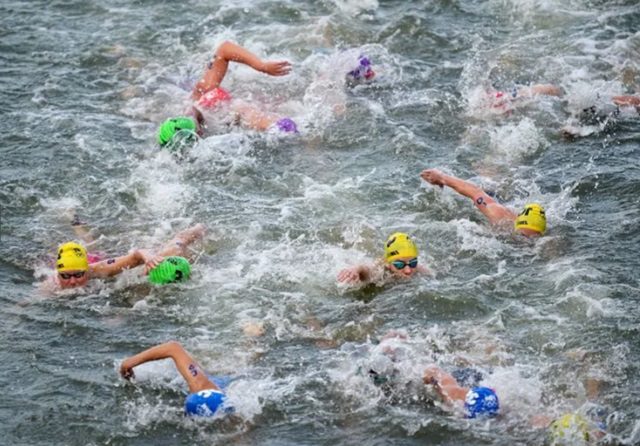BTN News: Cassandre Beaugrand of France won the gold medal in the women’s triathlon at the Paris Olympic Games on Wednesday. The crowd was thrilled. The event was also a big deal because it showed that the hosts’ plan to hold the swimming part of the race in the Seine River worked. This decision was risky due to water quality concerns but turned out to be a success.
The triathlon is one of the top attractions at the Paris Olympic Games. The race started and ended at Pont Alexandre III, a famous bridge in the center of Paris. Athletes raced along the Champs-Élysées and past landmarks like the Musée d’Orsay. The men’s triathlon was supposed to happen on Tuesday but got moved to Wednesday morning because the river’s water quality wasn’t good enough. This delay added more excitement to the event.
The women’s triathlon began at 8 a.m., right after the overnight rain stopped. The athletes swam in the Seine and then cycled through the city, providing stunning views. The wet cobblestones on the Champs-Élysées made it hard for some competitors, causing a few to slip and fall from their bikes. Despite these challenges, the race went on, showing the athletes’ strong spirit.
Cassandre Beaugrand, the world’s top-ranked triathlete, made her winning move during the last lap of the running segment. She pulled ahead of the others and crossed the finish line with the crowd cheering. Her win was a proud moment for France. Switzerland’s Julie Derron won the silver medal, and Great Britain’s Beth Potter took the bronze.
The successful event was a relief for the teams, athletes, and Paris officials. They have promised to make the Seine cleaner as a lasting benefit of the Games. Using the river for the swimming part was risky because the water quality changes often and can get worse after rain. Careful testing and quick decisions ensured the water was safe for the race.
Benjamin Maze, the technical director of the French Triathlon Federation, was very happy with the outcome. He said that once they knew the event would happen, the athletes could focus on competing. Many others felt the same relief and excitement.
Despite the rain the night before, the races went ahead on Wednesday. Organizers made their decision based on water samples taken early the previous morning and talks with weather experts. The rain started again around 5:45 a.m. on Wednesday, making the cycling part harder with its sharp turns and cobblestone streets.
Fifty-five women from 34 countries started the race at 8 a.m. They jumped into the Seine from a floating platform near the bridge. Beaugrand and Potter led the pack from the start. By 3:20 a.m., the latest water tests showed the Seine was safe for the triathlon, so the event went on as planned.
Paris has spent 1.4 billion euros (1.52 billion dollars) on wastewater projects to reduce pollution in the Seine. This big investment shows the city’s commitment to cleaner water and a positive legacy from the Games. Paris Mayor Anne Hidalgo even swam in the river earlier this month to show it was safe.
The last-minute delay of the men’s race on Tuesday upset some athletes. Belgian triathlete Marten van Riel said on social media that if athlete health was the main concern, the event should have been moved earlier.
Despite these issues, the women’s triathlon was a great success. Beaugrand’s win brought glory to France and showed the power of careful planning and determination. The Paris Olympics continue to impress, with the city proudly showing its beauty and resilience to the world.


